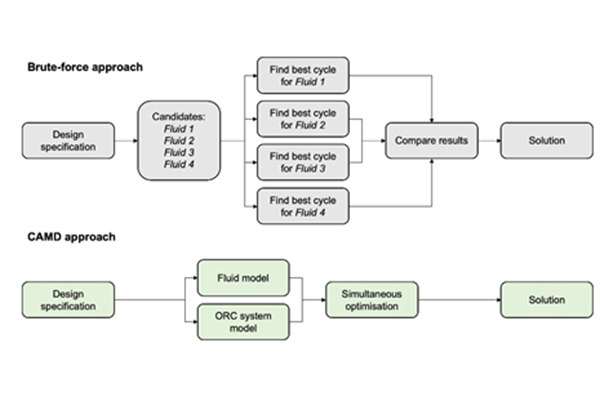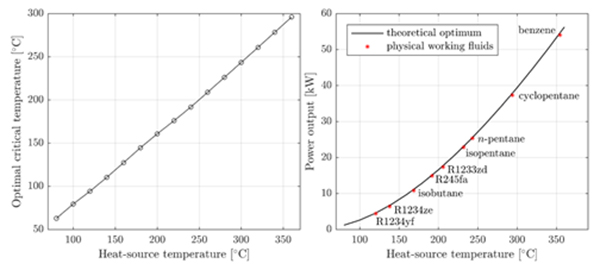Fluid Machinery Group
Dr Martin White is the 2019 winner for his paper titled, "A Generalised Assessment of Working Fluids and Radial Turbines for Non-Recuperated Subcritical Organic Rankine Cycles"[1].
The method developed by City University’s award-winning Thermo-Fluid Research Centre researchers takes a more holistic approach to the problem of organic Rankine cycles, which have great potential to contribute to the UK's mix of low-carbon technologies.
Dr White, a Lecturer in thermal power, explains that the steam cycle, or Rankine cycle, has been used since the industrial revolution for the conversion of heat into power. However, for the conversion of low-temperature heat (around 80 to 400°C) into power the steam cycle performs poorly. An organic Rankine cycle, or ORC, is essentially the same cycle, but instead of operating with water it operates with a different fluid, such as a refrigerant. Their advantage is that they perform better at lower temperatures, which makes them suitable candidates for power generation from a range of sustainable low-temperature heat sources, such as solar thermal and geothermal, in addition to being suitable for waste-heat recovery applications.
However, the question of what fluid is best for ORC systems remains an open research question.
Dr White says that the most common approach to finding an optimal fluid for a particular application relies on a brute-force approach. In this approach, the performance of the system is evaluated for every fluid under consideration and the fluid with the best performance is selected. However, this method can be time consuming and is not guaranteed to identify the optimal solution.
>
 Figure 1: Models to identify optimal characteristic of the fluid. Top: brute-force approach. Bottom: approach adopted in the paper borrowed from computer-aided molecular design ideas
Figure 1: Models to identify optimal characteristic of the fluid. Top: brute-force approach. Bottom: approach adopted in the paper borrowed from computer-aided molecular design ideas
The method developed within Dr White’s paper approaches the problem more holistically by developing a model that can be used to simultaneously identify the optimal characteristics of the fluid in addition to the ORC system. Once the optimal characteristics are identified these can then be mapped against a database of existing fluids to identify the fluid that has the properties that are closest to this optimal solution. Ultimately, this method can streamline the selection process for a fluid and point the towards an optimal fluid without relying on the less efficient brute-force method. Within the paper, the optimal design of the turbomachinery is also investigated which reveals how the performance of the turbine varies with the temperature of the heat source. Ultimately, these results could help identify routes for future efficiency improvements.

Figure 2: Left: the results from the study reveal a linear relationship between the heat-source temperature and the optimal critical temperature of the fluid. Right: a comparison of the model to physical fluids reveals the ability of the model to accurately predict the power output that can be obtained.
Organic Rankine cycles (ORC) have great potential to contribute to the UK's mix of low-carbon technologies with promising applications such as combined heat and power, concentrated-solar power and waste-heat recovery from reciprocating engines and other industrial processes with waste heat streams. Despite the successful commercialisation of ORCs for industrial-scale applications, more development is required at the commercial and domestic scales before its potential can be realised. More specifically, at these small-scales, the challenge lies in the design of systems that are efficient but are also low cost. One approach to achieving this is to develop systems that operate efficiently over a range of different conditions. This will enable the high-volume, low-cost production of ORC systems, enabling significant improvements in the economy-of-scale.
For more information on this approach, please visit weblink [2 below.
[1] https://www.mdpi.com/1996-1073/11/4/800
[2] https://martintwhite.github.io/research/2019/07/30/Frontiers-Spotlight.html